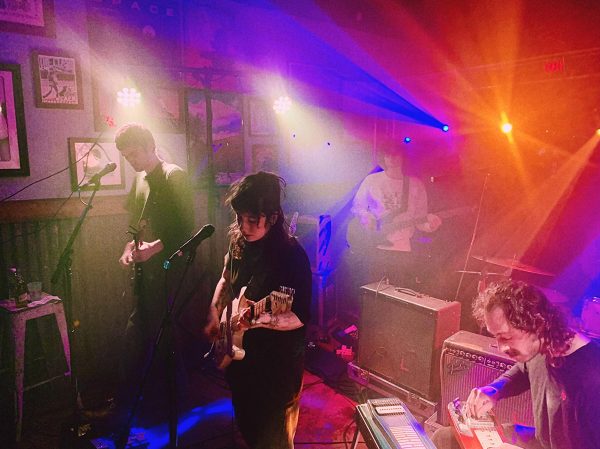Lana Del Rey releases highly anticipated new album
Lana Del Rey performs at a concert on the second day of Aerodrome Festival in Panensky Tynec, Czech Republic, Friday, June 29, 2018. Photo by Ondrej Hajek/CTK/Zuma Press/TNS.
It has been eight years since “Video Games” launched Lana Del Rey to acclaim, seven years since a disastrous performance on SNL dimmed her rising star and six years since the Cedric Gervais’ remix of her “Summertime Sadness” cracked the top ten, her only song to do so. That is where many left Del Rey: morose while at a party, begging you to kiss her (hard!) before you left her.
In her time away from the limelight, Del Rey has evolved so subtly that someone who has not been paying attention is likely to miss it altogether. Indie’s favorite sad girl became happy overnight. The cover of 2017’s “Lust For Life” found her grinning ear-to-ear, but on that album, her attempt to reconcile her old and new sounds found shaky footing among the A$AP Rocky collaborations and wall-of-sound production that drowned her out. “Norman Fucking Rockwell!,” her sixth album, finds Del Rey no happier than the last, but something better—tough.
The first lines, “Goddamn man-child, / you fucked me so good that I almost said I love you,” does for Del Rey’s desperate Lolita image what “A Star Is Born” did for Lady Gaga, eccentric dance diva. The same song finds her chastising her boyfriend for his moodiness, pretentiousness and bad treatment of her—all the qualities Del Rey lauded in her older songs. The newfound confidence and even condescension is a thread that runs through the album. The chorus of “Mariner’s Apartment Complex” finds her chanting, “I’m your man, / I’m your man” as she laments everyone who “. . . mistook (her) kindness for weakness.” “California” finds her at the most detached she has ever been, interspersing promises to fix her damaged lover with a languid, “. . .I’ll catch you on the flip side / If you come back to California, you should just hit me up.” This all comes to a head on the closer, “hope is a dangerous thing for a woman like me to have – but I have it,” which opens with her lamenting that she is not the high-heeled debutante from a Slim Aaron photo that she spent years pretending to be. She concedes that she is not a happy person, but also that she is done with caring. It takes a certain attitude to give an album a name like that, and Del Rey has it.
When she exploded onto the scene in 2011, Del Rey’s kitschy pastiche of mid-century Americana came as a classy kick in the ass to a country that had forsaken its icons for Ke$ha and Pitbull. In 2019, that flag-waving nostalgia for pre-Kennedy America would seem tone-deaf at best. Del Rey has never been a political artist, but the omission of her definitive nostalgia. No “National Anthem,” no tongue-in-cheek odes to excess. While still drawing from the same well of pop culture references, she makes them more meaningfully intimate than before. Both “Bartender” and “Venice Bitch” evoke Crosby, Stills & Nash, the latter of which uses the chorus of the trio’s “Our House” to communicate domestic bliss. “Nothing gold can stay” is, of course, a Robert Frost reference, but it is a celebration of the present more than an ode to the past. For the first time, Del Rey sounds in-the-moment rather than like she is playing catch-up to a bygone era.
Still more evidence of Del Rey’s growth: her standout cover of ska-punk titans Sublime’s “Doin’ Time,” one of those conceptually perfect covers that, like The Cardigans’ cover of Black Sabbath’s “Iron Man,” I am going to find a way to fit into every conversation I have for a long time. (By the way, did you know that The Cardigans covered “Iron Man”?) It feels too perfect that Del Rey, whose first album included a cover of the 1950 classic “Blue Velvet” would end up here, cooing trashy frat lyrics like, “What am I gonna be doin‘ for a while? / Said I’m gonna play with myself,” with the same sincerity as the sample of Ella Fitzgerald’s “Summertime” that kicks off the song.
The most exciting change this record represents happens on a technical level. NFR finds Del Rey working with The Bleachers’ Jack Antonoff. Antonoff co-produced Taylor Swift’s Lover earlier this month, an album whose best moments recall the sweeping opulence of a Del Rey record. But in his work with the real deal, Antonoff strips back the grandiose production that critics have always felt Del Rey uses as a crutch to hide a lack of talent under layers of cinematic production. “NFR” strips back the mix and polishes each song until it shines. Del Rey’s vocals no longer drown in reverb and echo. Her clean singing complements the new acoustic instrumentation, which swells to the same heights as classic Del Rey. The guitar on “Venice Bitch” is a highlight, as is the piano on “Happiness is a Butterfly.” “Not for nothing” is the album’s most uneven song, “The Next Best American Record,” a leftover from “Lust For Life,” whose chorus bears the marks of that album’s flirtation with trap music. The more mature, laid-back sound shows that even an artist as static as Del Rey can mature with age.
The chief problem is that the 14-song album asks you to spend an intimate hour with Del Rey. Every song is good, but every song sounds like a slight variant on the song before it, itself variants on the same song Del Rey’s been writing since “Born To Die.” It is a smoldering slog that had to be experienced as an album but can not be enjoyed as one. I was only mildly surprised to find that “Venice Bitch” is almost ten minutes long; the real surprise was that it was the only one that long. It is an album about a vibe, and it is a vibe you must give yourself over to, body and soul.
By sounding the least like herself she has ever sounded, Del Rey has delivered the definitive Lana Del Rey record. It may not win over anyone who is not already a fan, but it does deserve to.












